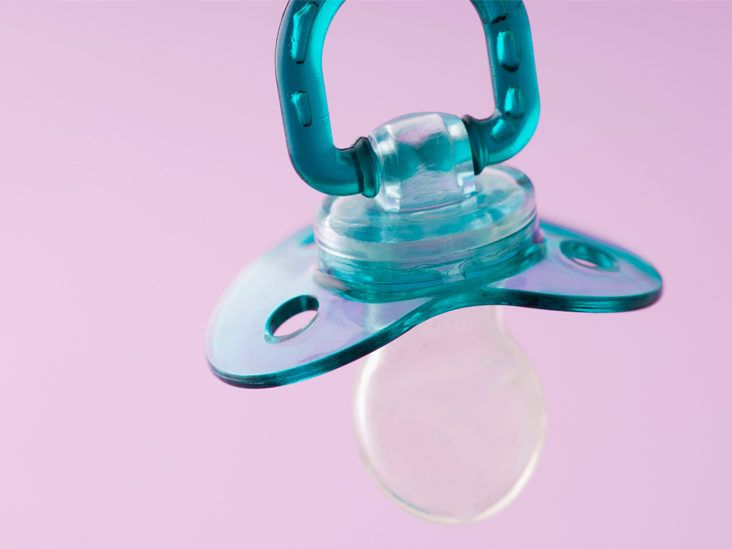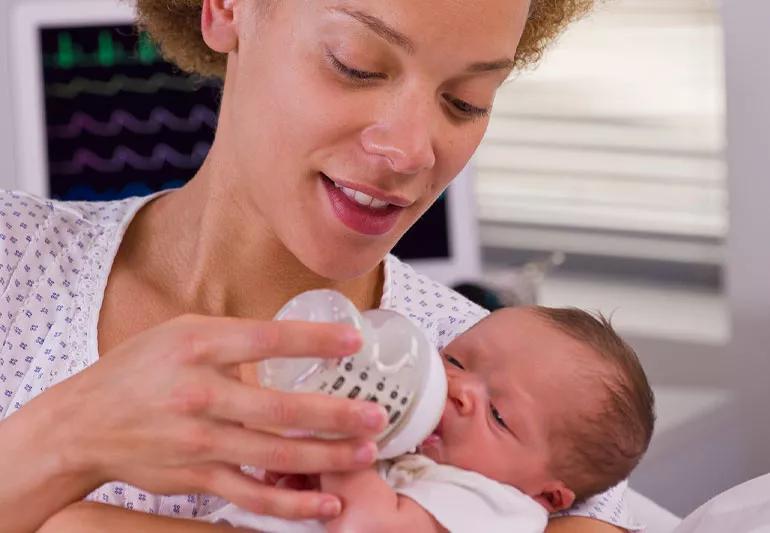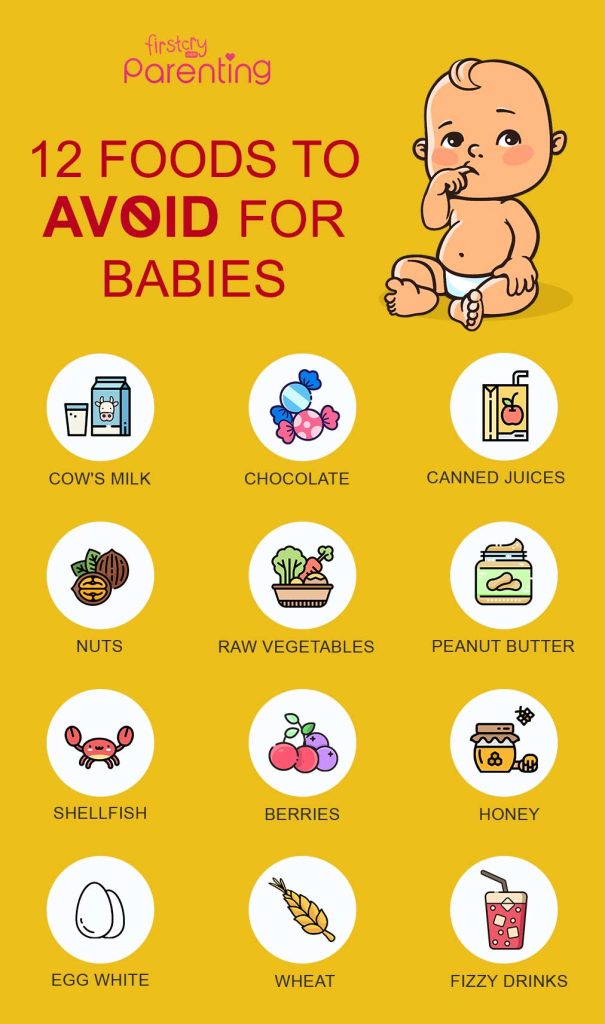A pacifier can interfere with breastfeeding, especially in the early weeks. It may cause nipple confusion and reduced milk supply.
Breastfeeding is crucial for a baby’s development and a mother’s health. Introducing a pacifier too soon might cause issues. The baby could struggle to latch properly, leading to less effective feeding. This can result in a reduced milk supply for the mother.
Health professionals often recommend waiting until breastfeeding is well-established. Typically, this happens around 3 to 4 weeks after birth. Monitoring the baby’s feeding patterns and ensuring proper latch techniques can help. Parents should consult healthcare providers for personalized advice. Making informed decisions can support both successful breastfeeding and the safe use of a pacifier.
Introduction To Pacifiers And Breastfeeding
Many new parents ask: Will a pacifier interfere with breastfeeding? The relationship between pacifiers and breastfeeding has long been debated. Understanding the dynamics helps parents make informed decisions.
Historical Context
Pacifiers have been around for centuries. Early forms were made from materials like clay and silver. Their primary purpose was to soothe fussy babies. But their impact on breastfeeding wasn’t considered until modern times.
In the 20th century, experts began studying pacifiers. They wanted to know if pacifiers affected breastfeeding success. Early studies suggested a possible negative impact. This led to caution among parents and healthcare providers.
Modern Perspectives
Today, research offers more nuanced views. Many studies show that pacifiers do not always interfere with breastfeeding. Timing and frequency of pacifier use are crucial factors.
Experts now advise introducing pacifiers after breastfeeding is well-established. This usually means waiting until the baby is about 3-4 weeks old. They believe this approach minimizes any potential issues.
Let’s summarize some key points in a table:
| Factor | Recommendation |
|---|---|
| Timing of Introduction | After 3-4 weeks |
| Frequency of Use | Moderate to occasional |
| Primary Purpose | Soothing, not replacing breastfeeding |
Modern guidelines suggest balance. Parents should observe their baby’s needs. They should also consult healthcare professionals for personalized advice.
Benefits Of Using A Pacifier
Pacifiers are more than just a baby accessory. They offer numerous benefits that can aid in a child’s development and comfort. This section explores the benefits of using a pacifier, specifically focusing on its ability to soothe babies and serve as a sleep aid.
Soothing Babies
Pacifiers provide a calming effect for babies. The sucking motion helps them relax and feel secure. This can be especially helpful during stressful times, like vaccinations or long car rides.
Studies show that pacifiers can reduce a baby’s stress levels. This is beneficial for both baby and parent. A calm baby is easier to manage and happier.
Pacifiers can also reduce crying. This is particularly useful in public places. Parents can quickly soothe their baby, keeping everyone around them happy.
Sleep Aid
Many parents find pacifiers to be a useful sleep aid. Babies often have trouble falling asleep. A pacifier can help them drift off more easily.
Research indicates that pacifiers may reduce the risk of sudden infant death syndrome (SIDS). This is an important benefit that adds peace of mind for parents.
Pacifiers can also help establish a sleep routine. Babies learn to associate the pacifier with bedtime. This makes it easier for parents to create consistent sleep habits.
In summary, pacifiers serve multiple benefits. They soothe babies and help them sleep better. These advantages make pacifiers a valuable tool for parents.
Potential Drawbacks Of Pacifiers
Pacifiers can soothe babies, but they come with drawbacks. Parents should consider these before introducing a pacifier. Understanding these issues can help make an informed decision.
Dental Concerns
Using pacifiers for a long time can affect a child’s teeth. Prolonged use can lead to misaligned teeth and bite problems. The American Dental Association suggests limiting pacifier use after age two.
Here is a quick overview:
| Age | Potential Issues |
|---|---|
| 0-2 years | No significant dental issues |
| 2-4 years | Potential alignment problems |
| 4+ years | Increased risk of bite issues |
Nipple Confusion
Pacifiers can cause nipple confusion in some infants. This happens when babies struggle to switch between the pacifier and the breast. It might lead to breastfeeding challenges.
Key points to remember:
- Introduce pacifiers after breastfeeding is well-established.
- Watch for signs of nipple confusion.
- Consult a lactation expert if issues arise.
Early introduction of a pacifier can disrupt breastfeeding patterns. Waiting until breastfeeding is stable can help avoid these issues.

Credit: researchoutreach.org
Impact On Breastfeeding
The impact of pacifiers on breastfeeding is a topic of much debate. Some parents worry if using a pacifier will interfere with breastfeeding success. Understanding the potential impact can help make informed decisions.
Latch Issues
Pacifiers can sometimes cause latch issues for newborns. Babies might get confused between the pacifier and the breast. This is known as nipple confusion. A good latch is crucial for effective breastfeeding. If a baby latches poorly, it can lead to sore nipples for the mother. It can also result in inadequate milk transfer for the baby.
Newborns need time to learn how to latch properly. Introducing a pacifier too early might hinder this learning process. Experts often recommend waiting a few weeks before introducing a pacifier. This allows the baby to establish a strong breastfeeding routine first.
Milk Supply
Frequent breastfeeding helps to establish a robust milk supply. Babies who use pacifiers might breastfeed less often. This can signal the mother’s body to produce less milk. Supply and demand is a key principle in breastfeeding. If the demand decreases, so does the supply.
Using a pacifier can also interfere with nighttime feedings. Nighttime nursing is especially important for maintaining milk supply. If a baby sleeps longer with a pacifier, they may miss crucial feedings.
Below is a simple table showing how pacifier use can impact milk supply:
| Pacifier Use | Milk Supply Impact |
|---|---|
| Frequent Use | Potential Decrease |
| Occasional Use | Minimal Impact |
Balancing pacifier use with breastfeeding can be challenging. Parents need to monitor their baby’s feeding patterns closely. Ensuring the baby gets enough breast milk is essential for growth and development.
Scientific Studies And Findings
Many parents wonder if using a pacifier will interfere with breastfeeding. Scientific research provides some answers. This section dives into the key studies and findings.
Research Overview
Several studies have explored the relationship between pacifier use and breastfeeding. These studies aim to understand if pacifiers affect the success of breastfeeding.
Research includes both short-term and long-term effects. Different groups of infants have been studied, including newborns and older babies. The results are mixed, but some patterns have emerged.
Key Takeaways
Below are the main points from the scientific studies:
- Early pacifier use: Introducing a pacifier in the first few weeks might affect breastfeeding.
- Long-term breastfeeding: Some studies suggest no significant impact on long-term breastfeeding success.
- Nipple confusion: A few studies indicate that pacifiers could cause nipple confusion in some babies.
- Comfort and sleep: Pacifiers can help soothe babies and improve sleep, indirectly supporting breastfeeding by reducing stress.
A table summarizing the findings might help:
| Study | Pacifier Use Start | Breastfeeding Impact |
|---|---|---|
| Study A | First Week | Possible Negative Impact |
| Study B | After First Month | No Significant Impact |
| Study C | First Three Weeks | Mixed Results |
Understanding these findings helps parents make informed decisions. Each baby is unique, so what works for one may not work for another.

Credit: www.healthline.com
Expert Opinions
Many parents wonder if using a pacifier will interfere with breastfeeding. Experts have shared their opinions on this topic. Below, we explore the views of pediatricians and advice from lactation consultants.
Pediatricians’ Views
Pediatricians have mixed opinions about pacifiers and breastfeeding. Some believe that pacifiers can cause “nipple confusion” in newborns. Nipple confusion may make it hard for babies to latch correctly.
Others think pacifiers help soothe babies, reducing stress for both baby and mother. They argue that a calm baby may breastfeed better. Pediatricians agree that pacifier use should be monitored closely.
| Pro | Con |
|---|---|
| Soothes the baby | Possible nipple confusion |
| Reduces stress | May affect latching |
| Helps with sleep | Can interfere with breastfeeding |
Lactation Consultants’ Advice
Lactation consultants often advise waiting before introducing a pacifier. They suggest waiting until breastfeeding is well established. This usually takes about 3-4 weeks.
Consultants recommend focusing on breastfeeding first. They emphasize the importance of skin-to-skin contact. This helps the baby learn to latch properly.
- Wait 3-4 weeks before introducing a pacifier
- Focus on skin-to-skin contact
- Ensure proper latching techniques
If breastfeeding issues arise, lactation consultants can offer personalized advice. They can help you find the best solution for you and your baby.
Practical Tips For Parents
Parents often worry about whether using a pacifier will interfere with breastfeeding. Here are some practical tips to help you make informed decisions. Ensure both you and your baby have a positive experience.
When To Introduce
Timing is crucial when introducing a pacifier. Experts recommend waiting until breastfeeding is well-established.
- Wait at least 3-4 weeks after birth before introducing a pacifier.
- Ensure your baby has a strong breastfeeding routine.
- Consult your pediatrician if you have concerns.
Introducing a pacifier too early can lead to nipple confusion. This might affect your baby’s latch and suckling technique. Patience is key in those initial weeks.
Alternatives To Pacifiers
If you prefer not to use a pacifier, there are alternatives. These can soothe and comfort your baby effectively.
| Alternative | Benefits |
|---|---|
| Swaddling | Provides warmth and security, mimicking the womb. |
| Rocking | Calms your baby with gentle motion. |
| White Noise | Helps to create a soothing environment. |
| Breastfeeding | Offers comfort and nutrition simultaneously. |
Each baby is different, so try different methods. Find what works best for your little one.

Credit: www.healthline.com
Frequently Asked Questions
Is It Okay To Use A Pacifier While Breastfeeding?
Yes, it is generally okay. Use pacifiers after breastfeeding is well-established to avoid nipple confusion. Consult your doctor for personalized advice.
Can Pacifier Cause Nursing Strike?
Yes, pacifiers can cause a nursing strike. Babies might prefer the pacifier over breastfeeding, leading to refusal.
How Does A Pacifier Reduce Milk Supply?
A pacifier can reduce milk supply by decreasing breastfeeding frequency, leading to less stimulation and milk production.
What Kind Of Pacifier Is Best For Breastfed Babies?
The best pacifiers for breastfed babies are those designed to mimic the shape of the mother’s nipple.
Conclusion
Pacifiers can be a helpful tool when used correctly. They don’t necessarily interfere with breastfeeding. Monitor your baby’s cues and consult healthcare professionals for personalized advice. Balancing pacifier use and breastfeeding can ensure both comfort and proper nutrition for your baby.
Your unique situation will guide the best approach.


